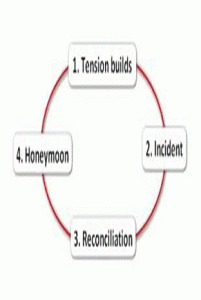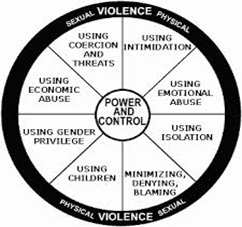What is Intimate Partner Violence?
The term “intimate partner violence” (IPV) describes physical, sexual, or psychological harm caused by a current or former partner or spouse. This type of violence can occur between heterosexual or same-sex couples and does not require sexual intimacy.
IPV is not necessarily a single attack or threat. It is a pattern of behaviour meant to exert power and control over the partner. The longer the abuse continues, the more devastating it becomes, and the more serious the injury to the partner.
Common Questions
Violence and abuse in relationships is never justified.
Can my partner really change?
Yes, but only if he/she gets help and keeps working at it. Asking for help is the first step towards change. What happens after that depends on your partner’s motivation and commitment to working on his/her problems. Real change is only possible if your partner decides he/she wants to change, regardless of whether you remain together or not. Change does not occur overnight, if it occurs at all. Even completion of an intimate partner violence intervention program does not guarantee your partner will change.
Am I to blame for this abuse?
Absolutely not. The only person responsible for your partner’s behaviour is your partner. The primary goal of counselling is to help your partner accept total responsibility for his/her use of violence regardless of whatever other problems may exist in the relationship. People who use abuse often blame their partners, their upbringings, alcohol, work pressures, frustration, or other issues for their use of abuse.
Doesn’t drinking cause my partner to be violent?
No. While some people are abusive only after they have been drinking, this does not mean that the alcohol causes the violence; it just makes it easier to avoid taking responsibility for the violence.
What if my partner is sorry?
 Many people who abuse their partners are sorry about it afterwards, but that doesn’t mean they will stop being violent. In fact, guilt and remorse are part of what’s known as the “cycle of violence” for some, (but not all) people who use abuse. During this stage, your partner may offer a “quick fix,” such as an apology, buying you something, or doing something around the house. If your partner truly wants to change, he/she must take total responsibility for his/her use of violence and the impact it has had on you and the children. It also takes many months of counselling — if it happens at all.
Many people who abuse their partners are sorry about it afterwards, but that doesn’t mean they will stop being violent. In fact, guilt and remorse are part of what’s known as the “cycle of violence” for some, (but not all) people who use abuse. During this stage, your partner may offer a “quick fix,” such as an apology, buying you something, or doing something around the house. If your partner truly wants to change, he/she must take total responsibility for his/her use of violence and the impact it has had on you and the children. It also takes many months of counselling — if it happens at all.
My partner’s always had an “anger problem.” What about anger management?
Many people, even some professionals, confuse intimate partner violence with “anger problems.” Many people who use abusive, controlling, and violent behaviours are not even angry when they are doing so — their intention is to control, manipulate, intimidate, hurt, or get their way. People with anger problems often do not have these intentions. If your partner agrees to get help, it is important for him/her to take an intimate partner violence intervention program, rather than anger management. Anger management programs do not address the issues of power and control in relationships.
Wouldn’t couple counselling be better?
Not if violence or the threat of violence still exists. The violence is not a reaction to you; it is a response to your partner’s own beliefs and attitudes. It is an attempt to control the situation. If you are afraid of your partner, you will not be able to express your own feelings, anger, and needs openly. It is only after the violence has ended that communication and other problems can be worked out.
How do I know if my partner is changing?
Has my partner completely stopped saying and doing things that frighten me?
Is my partner able to be angry without becoming verbally or physically abusive?
Can my partner respect what I am saying, even though he/she doesn’t agree?
Does my partner respect my right to say no?
Does my partner express feelings other than anger or pouting?
Does it feel safe to bring up topics that I know will upset my partner?
Can I spend time with my family/friends without being afraid that my partner will retaliate?
Do I feel respected and listened to when I want to speak?
Does my partner make me feel responsible for his/her frustrations or anger?
Does my partner respect my right to make my own decisions?
Trust your gut feelings regardless of other signs.
Support for Survivors
It is common for those who are being abused and criticized by their partners to feel isolated, depressed, and even crazy. Regular abuse, criticism, and ridicule can make anyone feel depressed or crazy. If you are having these feelings, you need to support from someone who understands what it is like to live with abuse and who will not judge you for what you do or don’t do.
Empathic Life Solutions offers individual and group counselling for women and men who have experienced IPV. Programs are also available for those who have used abusive behaviours in their intimate relationships. Contact us now.

